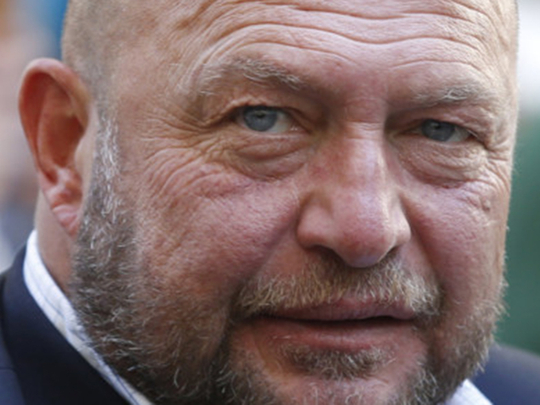
ISTANBUL: Mustafa Koc, the 55-year-old chairman of Turkish conglomerate Koc Holding and one of the country’s most prominent businessmen, died on Thursday after a heart attack.
Head of the pre-eminent dynasty of Turkey’s secular business elite, Koc has had, at times, an uneasy relationship with the Islamist-rooted AK Party founded by President Tayyip Erdogan.
Recently, there had been signs of reconciliation, however, and the two met on Wednesday, hours before Mustafa Koc died.
Koc’s businesses, which range from energy and automobiles to banking, account for close to 10 per cent of Turkey’s national output and include five of its 10 largest companies.
Sources from the presidential palace said Erdogan had called his father, Rahmi Koc, and his brother, Ali Koc, to express his condolences, saying Koc’s death had “saddened him deeply”.
Erdogan had met Mustafa and Ali Koc in the presidential palace in Ankara on Wednesday evening, the sources later said.
The Beykoz state hospital, where Koc was taken first, said in a statement that he had collapsed while exercising and had received emergency treatment from a trainer and guard.
It said his heart was not beating when he arrived at 08:10 am (0610 GMT) and efforts to resuscitate him began before he was transferred by helicopter to the American Hospital, a facility run by the Koc family foundation, in central Istanbul.
“Despite all the efforts of the doctors, we lost Mustafa Koc as a result of a heart attack which he suffered at home,” a hospital official told reporters outside the American Hospital.
Shares in Koc fell as much as 5 per cent after the news of his death, trading down 1.15 per cent by 1338 GMT, while the main Istanbul share index was 0.5 per cent weaker.
US Ambassador John Bass, writing on his Twitter account, described Koc’s death as “a great loss for Turkey and all his friends around the world”.
TURBULENT RELATIONS
From humble origins in the 1920s, the Koc empire came to represent the corporate face of Turkey’s secular Western-facing elite, part of society often viewed with suspicion by more conservative, pious segments of the population including some of Erdogan’s grass-roots supporters.
In 2013, Erdogan expressed anger with Koc’s Divan Hotel for opening its doors to protesters fleeing police during anti-government protests. The hotel called the actions humane and said accusations of backing the protests were unfair.
Commenting on the row in a March 2014 interview with Hurriyet newspaper, Mustafa Koc sought to play down any discord with political authorities but firmly defended the conglomerate.
“It is not fitting for us to fight with our state. But we have established our reputation over 90 years and we will not allow anyone to chew it up,” he said.
Subsequently, Erdogan attended an opening ceremony of a plant run by Koc’s oil refiner Tupras in December 2014, in a sign that relations were thawing.
Mustafa Koc was the grandson of Vehbi Koc, who founded the group in 1926, just three years after the modern secular Turkish Republic was established out of the ashes of the Ottoman Empire.
That year, Vehbi Koc had taken over a grocery store from his father in Ankara and later become the local representative of foreign companies such as Ford Motor Co and Standard Oil.
Koc Holding companies account for 9 per cent of Turkey’s exports and 18 per cent of the total market capitalisation of the Istanbul stock exchange, according to an investor presentation by the group this month.
Among its companies are oil refiner Tupras, automotive manufacturer Ford Otosan, car maker Tofas and appliance maker Arcelik.
Koc had been chairman since 2003.












